Advertisement
Coronavirus Coverage
What To Know About Coronavirus Vaccine Distribution In Mass.
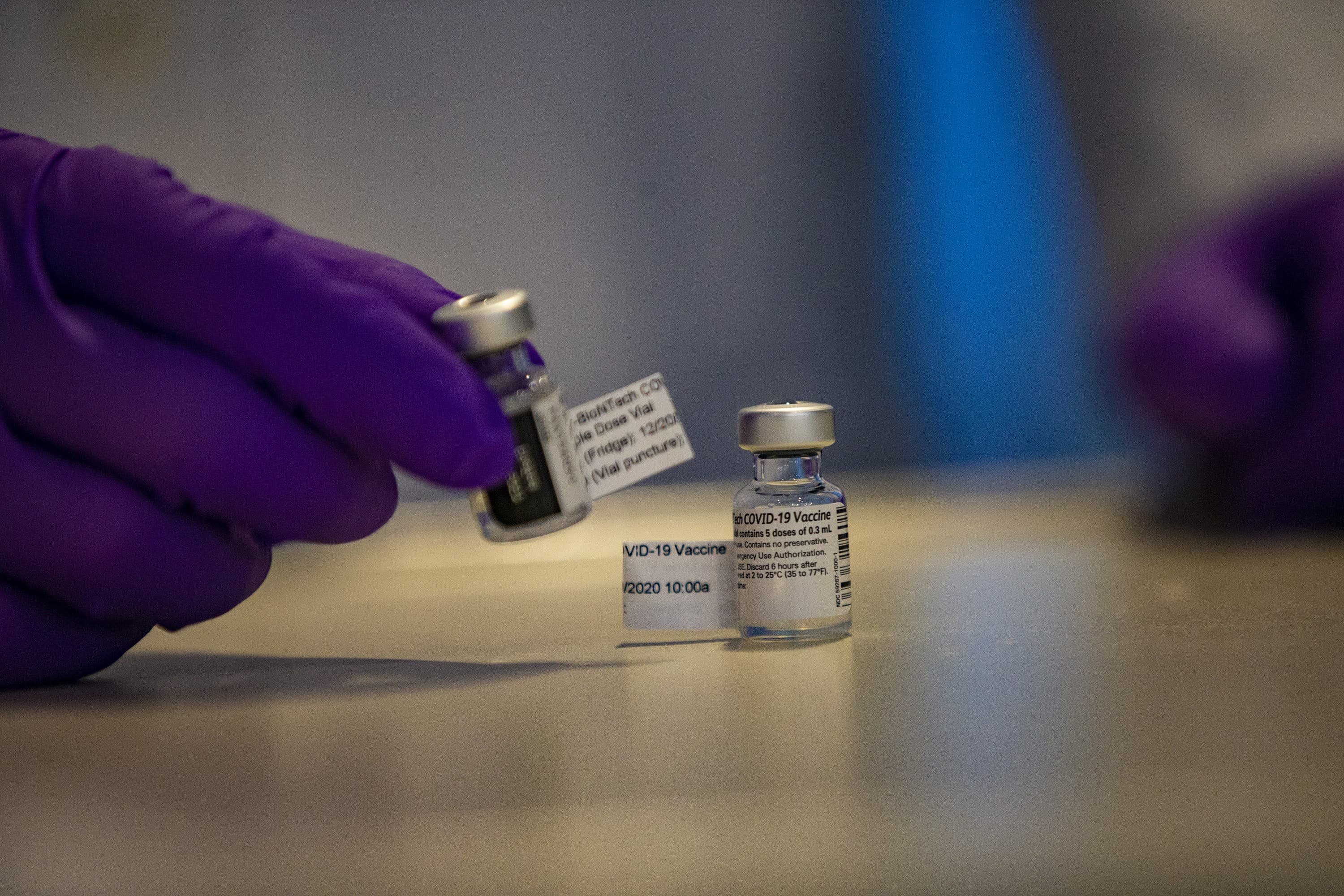
Mass. Vaccination In Charts
The Latest
Just about everyone in Massachusetts is now eligible for a coronavirus vaccine. (That's except for children age 11 or younger. On May 10, the FDA announced it would expand its emergency use authorization of the Pfizer/BioNTech vaccine to include children age 12-15.)
As of April 19, Patriots’ Day, appointments opened up for all residents age 16 or older. All Massachusetts residents became eligible for a vaccine in New Hampshire as of this day as well.
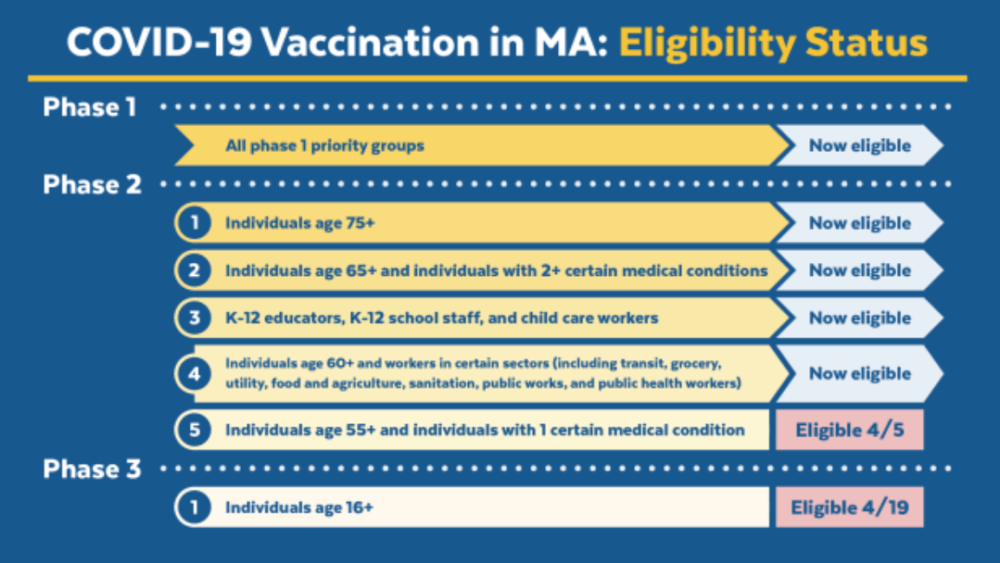
For months many residents preregistered for appointments and received shots at one of the state's seven mass vaccination sites. Throughout the state's rollout, this system helped health officials maximize the number of residents who could get vaccines in one location, and provided the option to set aside a few dates for appointments to vaccinate specific groups — like K-12 teachers and child care workers.
The preregistration site has now ceased operation, and the mass sites will be winding down soon. Gov. Charlie Baker announced that by the end of the July, the state will close all seven mass vaccination sites as it shifts to a smaller, more locally focused vaccine strategy. The first site to close will be Gillette Stadium on June 14, 2021, and the final two mass vaccination sites are scheduled to close by mid-July.
The new strategy will favor regional collaboratives, pharmacies, mobile and pop-up clinics, primary care doctors and other methods of reaching people, as the state tries to convince those who have not yet been vaccinated to get their shots.
Advertisement
Gov. Baker estimates the state is on track to vaccinate roughly four million residents by the end of June. While appointments were hard to get at first, they are now readily available without waits, and residents can even access walk-in vaccinations without an appointment at some sites.
Here’s more on the vaccine rollout in Massachusetts. (This post will be updated as new distribution details emerge.)
Vaccine Rollout Overview
Massachusetts has offered coronavirus vaccinations in three phases, prioritizing people needed to care for the sick, those considered most at risk for severe illness or death and residents in coronavirus hotspot communities.
Virtually all states began with the same top priorities: health care workers and nursing home residents. From there, many states added older residents, aged 65 and up.
Not Massachusetts. In phase one, it vaccinated many of what Baker called hard to reach, vulnerable groups before all seniors, such as shelter residents and prisoners.
Phase two began with residents age 75 and older. Friends and family members who bring them to an appointment can also be vaccinated at some clinics, including the state's mass vaccination sites and community health centers.
In February and March, the state expanded eligibility to include educators, residents 65 and older; residents and staff of low-income senior housing; and people who have at least two health conditions that put them at increased risk for severe COVID-19. There are about 1.5 million people in this group.
The next eligibility groups included workers from industries such as retail and restaurants and people with one health condition that put them at increased risk for severe illness from COVID.
Public health experts say it’s unlikely that Massachusetts will reach herd immunity until vaccines are available for children 15 and younger. After the Pfizer vaccine was authorized for children ages 12-15, Massachusetts began offering the shots on May 13. Moderna has applied for similar authorization for teens for its vaccine. Trials involving even younger children are also underway.
In phases two and three, Massachusetts has pledged to send 20% more vaccines to communities with the highest infection rates. The Baker administration is also directing federal dollars to the 20 hardest hit communities for outreach, staffing and other administration costs.
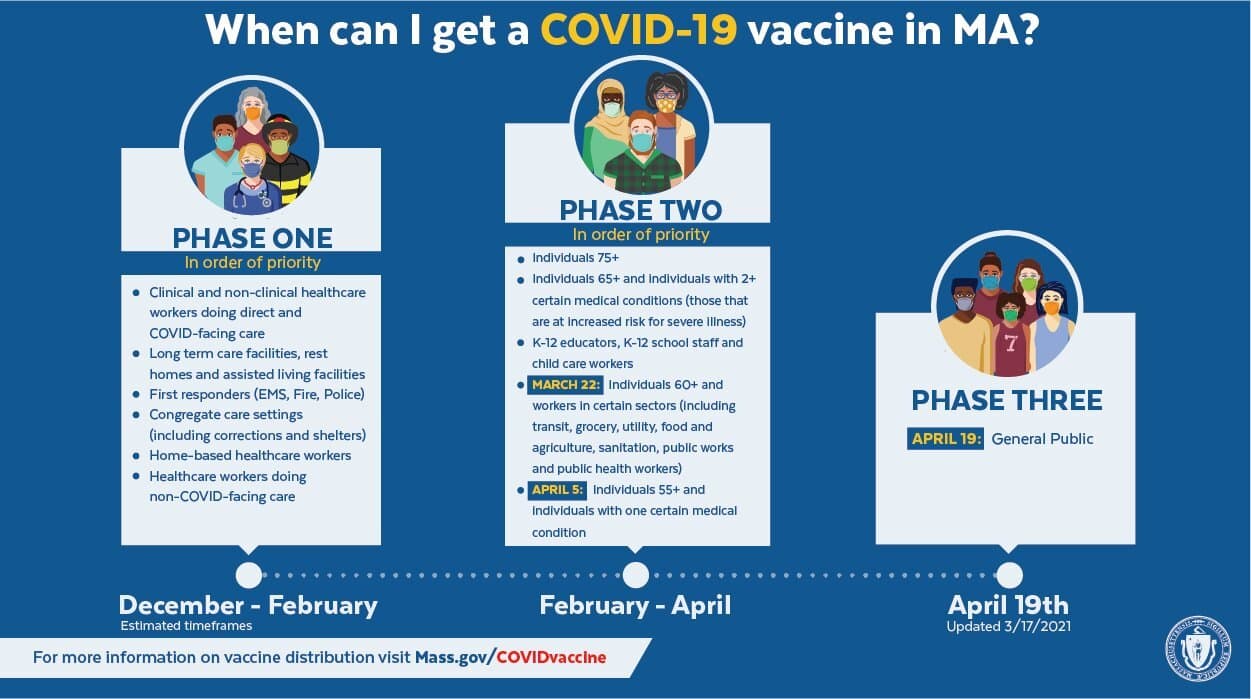
Vaccine Rollout FAQ
How do I sign up for a vaccine?
Six of the state's seven mass vaccination sites are currently taking walk-ins. Previously, the public was instructed to first make an appointment and register for their shots in advance. Those who preregistered were then notified when an appointment near them became available and were given 24 hours to take it. This preregistration system is no longer active.
Here’s a map of public vaccination sites, where you can search for an appointment. The state is also offering a vaccine finder website to help people find open slots at convenient locations. Keep in mind that the mass vaccination sites are winding down, and most will close in June.
Community health centers have been booking appointments for their patients and the public in areas they serve, as are some hospitals. Not all of the sites run by hospitals and community health centers are on the public map.
Seniors who need help can call 2-1-1. Many senior centers are calling local residents to help them sign up.
Where will I get the vaccine?
The state has more than 200 public vaccination clinics, including seven mega sites at Gillette Stadium, the Hynes Convention Center, the Reggie Lewis Center in Roxbury, the Double Tree Hilton Hotel in Danvers, the Eastfield Mall in Springfield, the Natick Mall and a former Circuit City in Dartmouth. In June, the sites at Gillette, Natick, Roxbury, Danvers, and the Hynes are scheduled to close. The sites in Springfield and Dartmouth will close in July.
Some cities and towns have regional clinics. Smaller sites include standalone pharmacies and those inside grocery stores, schools, municipal buildings, churches and physician offices.
Thirteen hospitals have public vaccination clinics. The state’s two largest hospital networks, Mass General Brigham and Beth Israel Lahey Health, are vaccinating their patients, so if you have been treated within these facilities you may be offered an appointment there.
Do I have to prove that I’m eligible?
Vaccination sites may ask for an ID. Residents in a priority group such as home care workers, patients with two or more high-risk conditions and teachers are asked to sign this form, confirming they are eligible. People with serious health conditions may want to talk to their doctors to decide if their health conditions qualify.
You will likely be asked to show your insurance card, if you have one, when you arrive at the vaccination site or when you sign up because the sites will bill your insurer for the cost of administering the vaccine.
What happens at the vaccination clinics?
You will be screened for the coronavirus. If you don't have symptoms, and you haven’t been in close contact with anyone who is positive, you may be asked for your identification or confirmation of your appointment before you proceed.
You’ll get the shot.
You’ll be observed in a waiting area for 15 minutes in case you have a rare, immediate adverse reaction, or 30 minutes if you have a history of allergic reactions.
You’ll leave with a card or certificate that indicates which vaccine you received, when and where. Take a picture of this card or make a copy of it. You will be asked for the card when it’s time for your second dose. And you may need the card to prove you’ve been vaccinated if the shots are required by employers or airlines, for example, at some point.
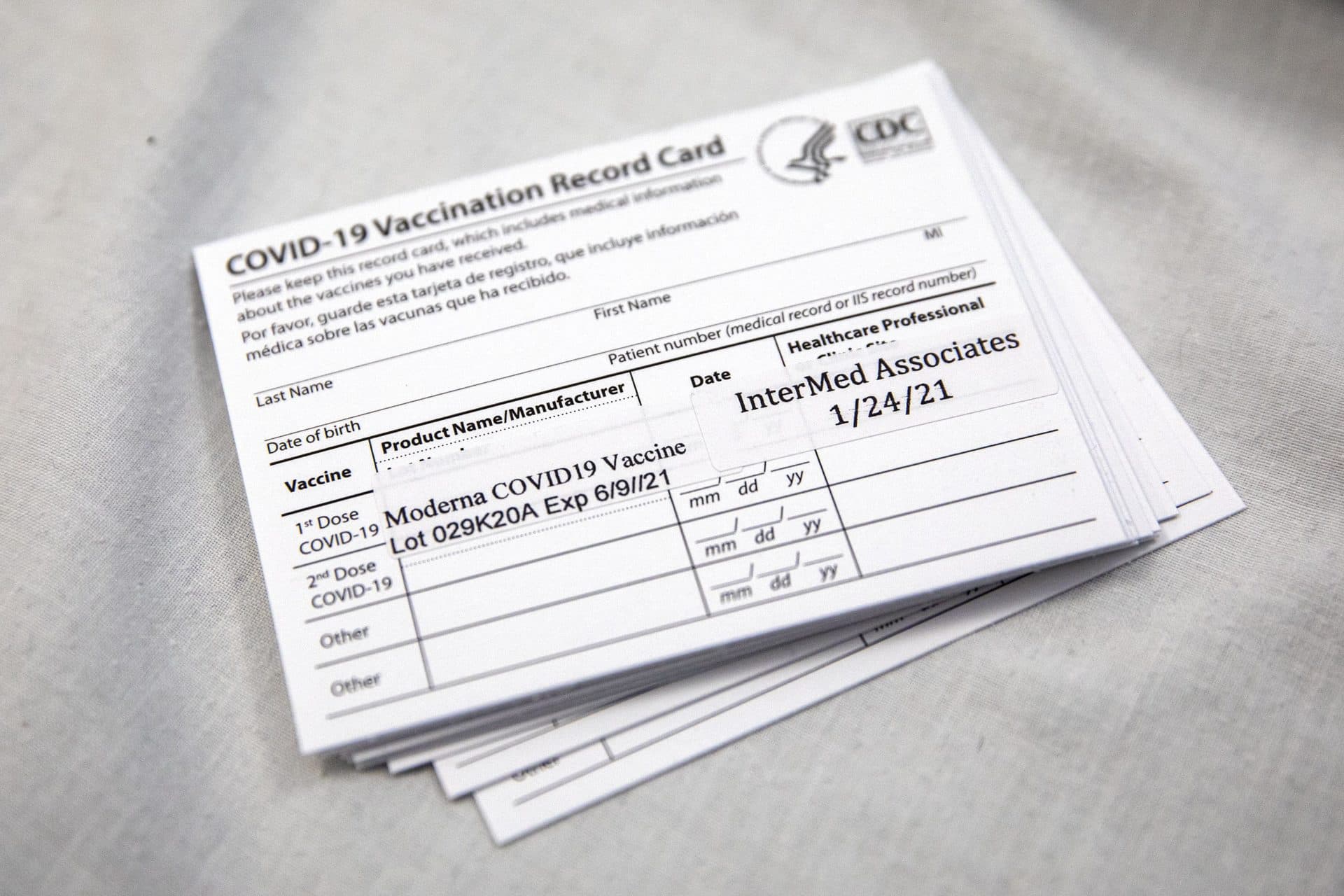
How will I know when to return for a required second dose, if needed?
Try to book your second dose appointment before you leave the site where you received the first dose. If you forget or something goes wrong with the booking, contact the site to let them know you need an appointment for a second dose.
Will I be able to choose which vaccine I get?
You may be able to shop for your choice of vaccine. Many of the vaccination sites list the vaccine that they offer. Experts say take whichever vaccine you are offered. The first two available vaccines, from Pfizer and Moderna, are similarly effective. Johnson & Johnson has been tested against more of the variants and is highly effective in preventing serious illness and death, but is linked to blood clots in 15 recipients. This is a very small fraction of the total number of people who have received the shot, so it is a rare but still possible side effect.
How will people be monitored for side effects?
The CDC has created an app called V-Safe where you can post information about mild side effects. Someone from the CDC may call you to discuss your reactions. If the headache, fever, nausea or chills persist, you should call your doctor or the vaccination clinic. (The app will also send reminders about a second vaccine dose, if needed.)
More serious side effects should be reported to the federal Vaccine Adverse Event Reporting System.
Can I still get infected after I’ve been vaccinated?
There are documented cases of fully vaccinated people becoming infected and testing positive for the coronavirus. These "breakthrough cases" are rare, and the illness tends to be less severe, but they do happen.
It's also worth noting that the Pfizer-BioNTech and Moderna vaccine trials looked at whether the shots protected recipients against developing the disease, COVID-19, not whether the vaccines prevent transmission of the virus. So you may still become infected and spread the virus even after you’ve been vaccinated. And some of the vaccines protect against some of the variants better than others. The bottom line for now: Masks and maintaining a safe physical distance in public are still recommended if you are not vaccinated. If you are vaccinated, congrats! Your risk of severe illness and of transmitting the virus to others will be greatly decreased. Massachusetts still requires masks in some settings, such as public transit and health care facilities.
How much will I be charged for a vaccine?
Your tax dollars are paying for the vaccines. The Baker administration says vaccine providers will not be allowed to turn anyone away and that health insurers have agreed not to charge members for the cost of administering vaccines — that means no fees, co-payments, co-insurance or payments toward your deductible.
Are the vaccines mandatory?
The vaccines will not be mandatory at first. In the future, employers, schools and government bodies may require vaccinations. Some colleges have already announced that the vaccines will be required for their students.
How can I learn more about vaccine safety?
For more about side effects, what to do if you're pregnant, and what you need to think about before you visit someone who has only received a first dose, read this vaccine FAQ from NPR.
Why did the state start with health care workers and nursing homes?
Massachusetts like most states began with health care workers to protect the staff caring for COVID patients. Staff and residents of long-term care facilities are at the top of the list because they are especially vulnerable to infection, serious illness and death from the coronavirus. As of late January, more than half of all COVID deaths in Massachusetts have been long-term care residents.
Hospitals began vaccinating staff on Dec. 14. Eligible employees included doctors, nurses, respiratory therapists and lab technicians in direct contact with COVID-19 patients, as well as people who disinfect rooms. Vaccinations for front-line staff at community health centers, coronavirus testing sites and vaccinators followed. CVS and Walgreens began vaccinating the staff and residents of nursing homes, assisted living facilities and rest homes on Dec. 28.
Here are more details for phase one, which has six subgroups.
The first front-line health care workers began receiving the Pfizer vaccine in mid-December. Long-term care residents and staff followed in late December. Clinics for the third group, first responders (including police, fire and EMTs), opened on Jan. 11.
People who live in large group settings (like prisons, homeless shelters, addiction treatment centers and group homes) are the fourth priority group in phase one. Home care workers and health care workers who do not deal directly with COVID patients, such as dentists, blood and organ donation employees and behavioral health providers are the final residents eligible in phase one. Everyone in phase one became eligible for the vaccine as of Jan. 21, 2021.
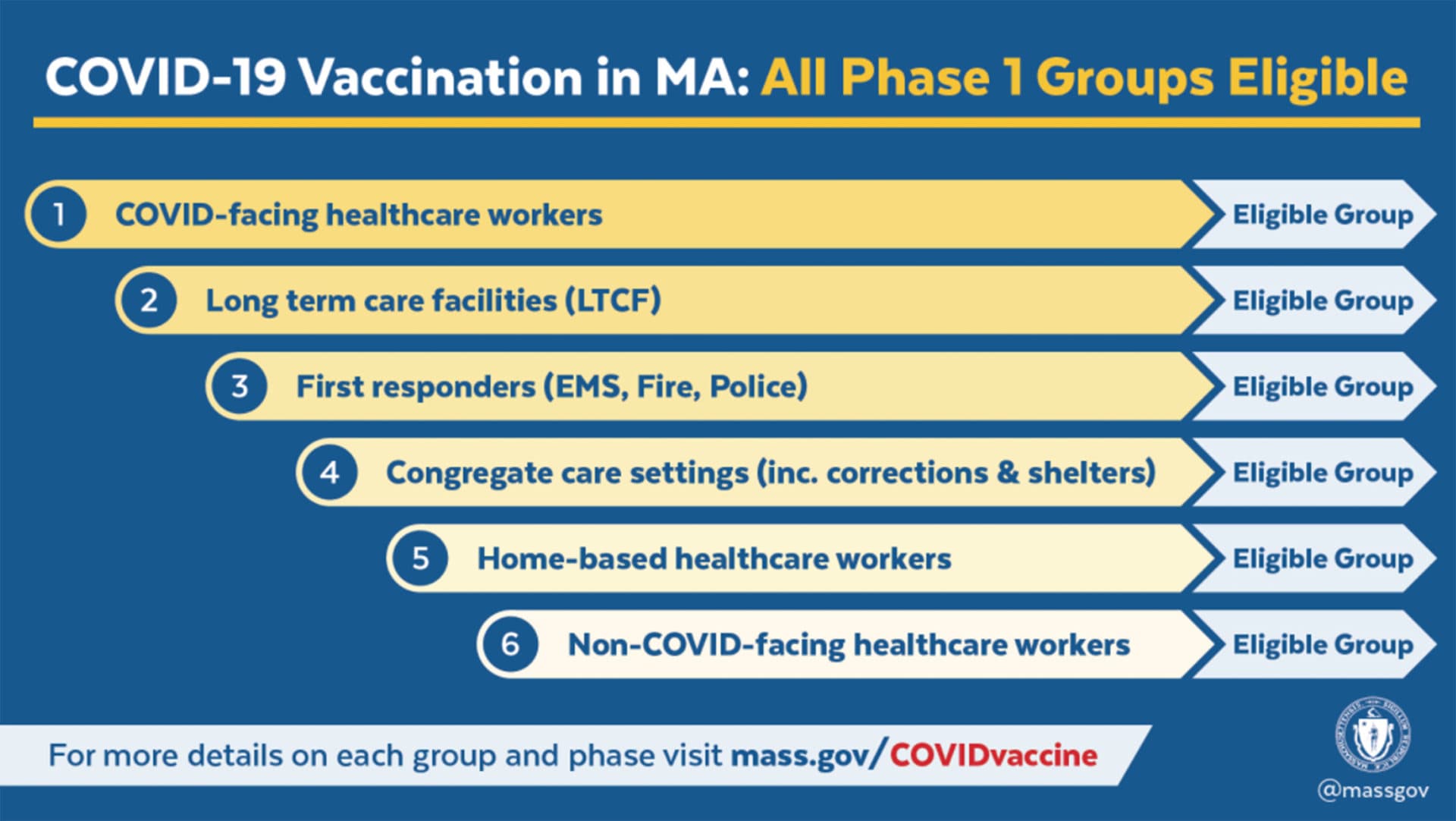
This article was originally published on December 23, 2020.
